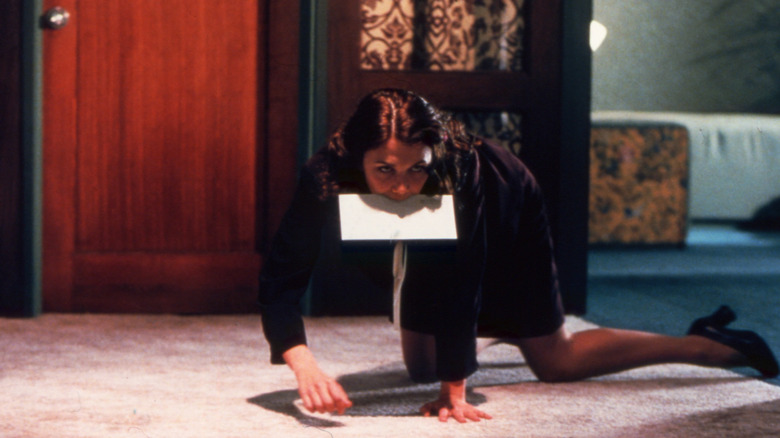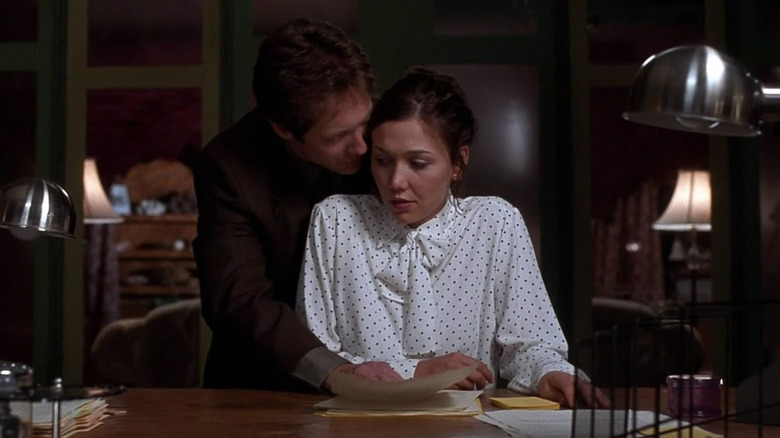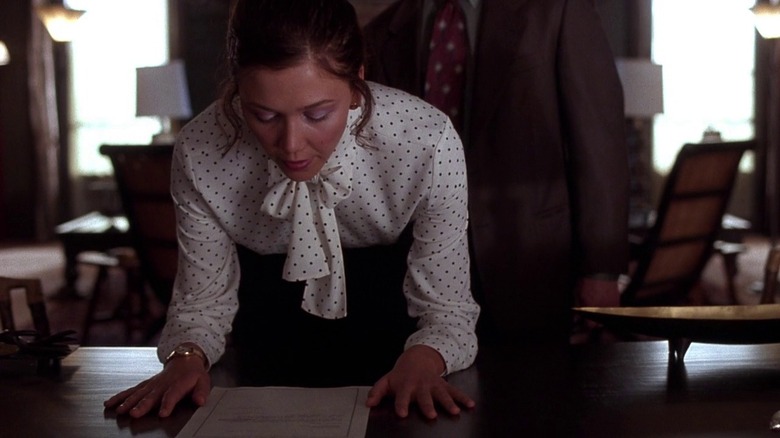20 Years Later, Secretary Is Still The Best Kinky Romance Of The 2000s
Hollywood has never had a healthy relationship with sex. Torn between leering salaciousness and code-mandated puritanism, the end results on-screen have often been messy, thematically conflicted, and deeply unsexy. Much has been made about the state of on-screen sensuality in 2022 and the blockbuster age, where ultra-muscular and fit bodies are fetishized yet entirely divorced from sex itself. As one viral article published last year in Blood Knife out it, "everyone is beautiful and no one is horny."
Things are improving in small ways, mostly on streaming thanks to shows like "Bridgerton" that undeniably f***, but everything remains pretty limited in terms of what goes on between the sheets. Kink of any kind is still a no-go topic for screens big and small. While the highly profitable adaptation of the much-derided "Fifty Shades" trilogy was sold as a journey into the dark pleasure of BDSM, the end results were decidedly vanilla and not all that erotic. Besides, 15 years prior, another movie beat it at its own game.
Released in 2002, "Secretary" brought sadomasochism to the forefront in a uniquely quirky romantic drama that blew the dust off the entire rom-com genre. Directed by Steven Shainberg and adapted very loosely from a Mary Gaitskill short story by Erin Cressida Wilson, "Secretary" delved into the curiously well-functioning relationship between Lee Holloway (Maggie Gyllenhaal), an awkward misfit who becomes the secretary and submissive of E. Edward Grey, an eccentric lawyer confused by his own dominant desires (he is, of course, played by James Spader, and yes, people have long wondered if "Fifty Shades" writer E.L. James borrowed the name Grey for her own purposes.) Opening with a scene where Lee, strutting through the office and completing her mundane duties while wearing an arm bar that keeps her spread out like a cross, the film announces its intentions loud and proud.
Maggie Gyllenhaal and James Spader have chemistry to burn
Maggie Gyllenhaal had her much-deserved breakout with "Secretary," establishing her unique brand of knowing charm that so many films have failed to utilize effectively over the decades. Lee begins as a mouse of a woman, fresh from a mental hospital following an incident of self-harm that went wrong and living with her warring parents. She seeks employment for the very first time as a means of independence, even as her mother waits for her in the car all day to drive her back home. She seems delicate, ready to break once more, but Gyllenhaal imbues Lee with a quiet determination that soon blossoms into true confidence. It's a Cinderella story with a touch of "Pygmalion," if Henry Higgins enjoyed administrating a thorough spanking to Eliza Doolittle.
The case could easily be made that James Spader is the most unfettered representation of pure sexual depravity that American cinema has had over the past 30-plus years. "Secretary" feels like the happy ending to the unofficial deviant cinematic trilogy that includes "Sex, Lies, and Videotape" and "Crash." While both of those films carry a far darker moral center, "Secretary" feels almost quaint by comparison. It's a reminder of Hollywood's squeamishness towards sex that "Secretary," which doesn't actually show that much sex, was considered so wholly raunchy when it premiered. The most striking Spader performances utilize his aura of worldly knowledge, that palpable sense that he truly has seen and done everything there is to experience. A blushing ingenue he is not!
Here, Spader is almost a Hugh Grant type, a rom-com hero with a slight bumbling edge (although Spader plays this nervousness with his typical combination of smarm and charm that has worked so well for close to four decades.) Grey isn't always at ease with his desires and Spader's skittishness brings his nervousness to the forefront. For an actor so good at embodying superego, it's remarkably effective when he squirms to reveal a kind of naivety to Grey's conundrum.
Their romance is, fittingly, a power play, but not one as straightforward as the dominant/submissive dynamic would suggest. Lee starts the story almost crushed by her own mental and familial struggles but these are not what make her an ideal sub for Grey. When she blooms into a confident and sensually assured woman, it makes Grey, who feels far less secure in his desires, feel off-center. She pursues him relentlessly in the third act, eager to prove to him that, yes, they can be a loving and committed couple who just so happen to enjoy a kinky dynamic 24/7. BDSM, typically portrayed on-screen as either a freakish spectacle or cartoonish self-parody, is something to be taken seriously here. Not too seriously, of course. "Secretary" has fun with Lee and Grey's games, such as when he saddles her up like a horse atop his desk. Gyllenhaal and Spader have chemistry to burn, a kind of spark that is impossible to recreate without the right actors in place. It's tough to imagine anyone else as Lee and Grey, let alone any 2022 movie star.
What Secretary gets right (and wrong)
None of this is to say that "Secretary" is some glowing representation of BDSM or should be taken as gospel. While it's leaps and bounds ahead of "Fifty Shades of Grey" in terms of the central dynamic, it's still ultimately a fantasy that doesn't always focus on laying out the ground rules for a safe and healthy dom/sub romance. You can certainly have a problem with that — and many do — although fans tend to be kinder to "Secretary" than E.L. James' "Twilight" fan fiction because its fantasies have a sense of humor about them (such as when Lee serenely counts out the peas Edward has told her she can eat while her family look on in bemusement).
"Secretary" also succeeds over "Fifty Shades" because it's not interested in justifying the characters' sexual proclivities as acts of trauma that must be explained. Lee finds solace in submission as a way to cope with her mental illness but it's a world away from the "Fifty Shades" series portraying a man's dominant desires as the side effect of sexual abuse and a negligent mother. It's not something to be "cured" to make way for missionary sex between man and wife with a baby in the next room. It's not an either/or decision: you can have both. Lee and Grey keep up their dynamic and that's the happy ending: two souls sharing a mutually beneficial love that doesn't fit into the smothering restrictions of traditional marriage. A happy-ever-after is whatever best suits the central couple, a reflection of the ways that they have found space in one another's lives for a future of bliss. Would that "Fifty Shades" had learned that lesson.
Twenty years later, "Secretary" still feels vibrant, sexy, romantic, and cut from a very different cloth. We're seeing more on-screen sensuality nowadays but progress remains maddeningly incremental. You can't help but wonder what's taking them so long when "Secretary" made it all look so easy.


